
Frequently Asked Questions
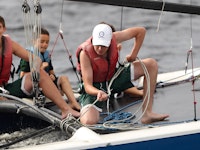

Why 7 Weeks?
Children don’t need to go away to sleep-away camp to swim, play tennis, or make lanyards. They can stay home and do those things. They go to sleep-away camp for the friendships and those take time.
For most children, camp is the first time they are away from their families, living with other children for an extended period of time. It takes time for children to become acclimated to bunk life and comfortable enough to start getting close to their fellow campers. Acquaintances made at a 3 or 4 week camp are fine, but it takes a 7 week camp to give a child really close friends.

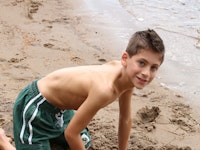
Enrollment & New Family Information
What is the New Family Enrollment Process?
- Begin your application & pay a deposit.
- Schedule a home visit, Zoom, or camp tour, so you can meet with a director.
- Complete your enrollment.
Choosing Raquette Lake is like choosing a private school. You want the very best for your child, and so do we. We want to know all RLC families so it’s important that we take the time to meet with you in your home, via video chat, or when you come to tour camp.
Will my Child Meet Other Kids Before Camp?
Raquette Lake is a community, and that community begins with your child’s bunk. Once your child is enrolled they will be introduced to pen pals from their bunk so they can start getting to know each other. We host reunions and off-season events around the world every year; new campers are invited to attend events near them. When convenient, Raquette Lake also partners with families to host sleepovers and smaller meet-ups.
Who Comes to Raquette Lake?
Campers come from far and wide. Many campers come from New York, New Jersey, Florida, California, Mexico, Spain, Japan, China and India. Campers also come from places like Massachusetts, Maryland, Delaware, Connecticut, Vermont, Rhode Island, Pennsylvania, Virginia, Kentucky, North Carolina, Georgia, Illinois, Oklahoma, Texas, Utah, Arizona, as well as Canada, Austria, Venezuela, Brazil, Cyprus, and Thailand — like we said, far and wide, and every year the mix is a little different!
Meeting children from other parts of the world is a rewarding part of the camp experience; we are very intentional that no school or community is over-represented at Raquette Lake.
Most counselor staff are domestic; some specialty staff come from overseas.
What Ages are Your Campers?
Our campers are between 6 and 15 years old.
How do You Decide What Bunk My Child is Placed In?
This is surely one of the most important decisions we make regarding your child’s experience at camp. Your visit with the director is the first step in the process. After enrollment, our forms ask for information such as your child’s requests, interests, hobbies, attending friends, school, and any other pertinent information. We then take the time to place them with other campers and staff who share similar interests.
How Will my Child Be Supervised? What is the Camper-to-Counselor Ratio?
Raquette Lake Camps have a 2-to-1 camper-to-counselor ratio with 24x7 supervision. Counselors follow campers to each program all day. Adult group leaders oversee the counselors in each age group, and communicate with parents regularly.


Brother/Sister Camp
What is a Brother/Sister Camp?
Practically speaking, Raquette Lake Boys Camp is a single-gender boys camp, and Raquette Lake Girls Camp is a single-gender girls camp. The camps have their own private properties on opposite sides of the lake. Boys’ Camp and Girls’ Camp come together weekly for full-camp socials and events so siblings get to see each other regularly.
Together, Raquette Lake Camps are owned and operated as one under the leadership of two generations of the Lapidus family. Being owned by the same family, the camps share the same philosophy, values and traditions.
Day-to-day activity programming is separate, but the programs are the same. We want boys and girls to have their own space and individual camp experiences, while still having the feeling of growing up together at camp, sharing memories of the same activities, remembering the same trips, and even knowing some of the same counselors.
Staff from both camps train together, and long-term staff rotate between the camps. We do this to help keep the community and values consistent on both sides of the lake.
We believe our brother/sister camp experience gives boys and girls the opportunity to thrive in a single-gender atmosphere, enjoy time socializing on their own, as well as spending structured time with the opposite gender, all under the intentional direction of single-family, multi-generational leadership, that provides consistency between the traditions of the past and our vision for the future.
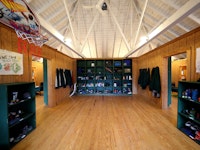
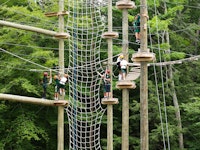
Facilities & Location
How Separate are the Facilities?
The camps have completely independent facilities. Located across the lake from each other, with noticeably different terrain and physical layouts, the camps offer nearly identical facilities for most activities. Unique to Girls’ Camp is their equestrian center and gymnastics area, while Boys’ Camp has a large beach and giant ropes course. These areas are shared during some programs and electives. Full-camp socials and events alternate between the two properties.
What Makes Raquette Lake’s Location Special?
Our private & exclusive location has been synonymous with wealth and luxury since the latter half of the 19th century when William West Durant, J. P. Morgan, Alfred Vanderbilt, and others began building their famous “Great Camp” retreats — hide-aways for tycoons, bankers, and politicians.
Raquette Lake is located deep in the Adirondack State Park, the largest state park in the country, and Raquette Lake is one of the largest lakes in the park. 100 miles of shoreline and almost no private homes or commercial operations makes Raquette Lake serene and peaceful. There is very little boat traffic so campers virtually have the lake to themselves.
Boys’ Camp and Girls’ Camp are located on peninsulas across the lake from each other. Boys’ Camp is only accessible via our private ferry. Surrounded by 46 high peaks, hundreds of rivers and smaller lakes, Raquette Lake and the Adirondack State Park offer thousands of miles of pristine wilderness for hiking, camping, canoeing, and other outdoor adventures.
How Do Kids Get to Camp?
We have private, chaperoned coach buses making round trips to a number of locations in New York City, New Jersey, Westchester, Connecticut & Long Island. We have staff-escorted flights from Florida and the D.C./Maryland area. We also offer private chaperoned flights from anywhere. Baggage will be picked up directly from your doorstep and returned at the end of camp. Our staff oversees the unpacking and packing of all baggage.
Where Can I Stay When I Bring My Children to Camp?
There are many beautiful places to stay near Raquette Lake Camps. Please make reservations in advance as space fills quickly.

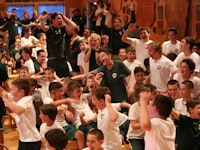
Camp Program, Competition, & Community
Do the Campers Make Their Own Schedules?
We are a structured camp — meaning that each camper’s bunk follows a pre-set schedule of five activity periods per day. A sixth “elective” period allows campers to participate in an activity of their choice. Your child can sign up in advance for intensive programs including: waterski/wake boarding, golf, intensive tennis, USTA tennis tournaments, ice hockey, horseback riding, and much more. We also offer tutoring and private instruction upon request.
My Child Likes Sports but is not Very Competitive. Will He Feel Comfortable at Raquette Lake?
Yes! Competition, while important, is not the driving force behind our program. We prefer to emphasize proper instruction, sportsmanship, teamwork, and confidence. There will be elements of all the above in each of our activities, from individual to team sports. Throughout the summer, campers that want more competition can sign up for one of our numerous inter-camp teams to play against other camps in the region.
How Does Raquette Lake Foster International Community?
It is our core philosophy to be open, accepting, and part of the global community. Campers come from all over, and so do our staff* — it’s a community that cannot be replicated! Your child will be a part of this community, and will make friends with children from all over the US and other countries! By emphasizing sportsmanship, independence, team work, and acceptance — life lessons that cross borders and translate into any language — your child will be better prepared to succeed in school, college, and through the rest of their lives.
*We hire and utilize foreign staff as necessary to help international campers with communication difficulties.
How Do You Staff the Camp? Where Do They Come From? What Are Their Ages?
The administrative staff is comprised of our Directors, who work full time, year round, to organize all that occurs in our seven-week camp program. Many of them grew up at Raquette Lake as campers and counselors.
Our Group Leaders are all college-educated adults, many of whom are Raquette Lake alumni and parents themselves. The vast majority of them are teachers during rest of the year, and they return summer after summer.
Our Activity Heads are experts in their fields. They come from countries around the world to bring to Raquette Lake the best of what their sport has to offer. Many are professional athletes, college and high school team coaches.
Our Counselors are all college students who have specific experience working with children in a number of capacities. They are interviewed face-to-face and hired by our directors throughout the year. We also do a thorough background check of every staff member. Before camp all staff participate in a mandatory orientation; many staff spend more than a month preparing for the summer.
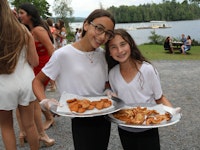
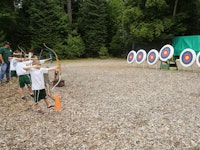
Food, Health, & Safety
How Does Raquette Lake Keep Campers Safe & Healthy?
Safety begins with preparedness, knowledge, and training. All Raquette Lake staff receive First Aid training, waterfront staff are Lifeguards, trip staff have Wilderness First Aid certifications, and there are appropriate safety protocols for each activity.
Good health begins with good food, lots of exercise, and time outdoors — things we have an abundance of at camp!
In the event a child is unwell, each camp has a fully staffed infirmary on the property with 5 full time nurses and a doctor. Our Medical Director oversees both infirmaries, coordinates with camp families, and consults with specialists as needed. Medical facilities include a state of the art examination room, private rooms and bathrooms, plus creature comforts to pass the time — books, movies, video games, and more.
Allergies
We have an Allergy Specialist on staff and all personnel are trained with Epi pens. If your child has an allergy their group leader will be provided with any special instruction.
Food
Our dining rooms are under the supervision of a food service director and two trained chefs. We are nut-free* and specialize in handling many other food allergies (gluten, legumes, dairy, etc.).
*We only buy food from nut free facilities.
Medications
We employ a service to pre-package prescriptions. Our team of nurses and doctors work closely with your home doctors to ensure that your child receives the right medication at the right time.
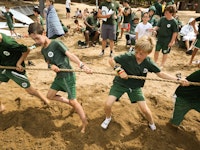

Electronics & Uniforms
What Electronics are Permitted at Camp?
Raquette Lake is proudly screen free! We allow music players without screens and other electronics such as personal fans, flashlights, etc. but we don’t allow anything else. We want our campers to look up and not down, join the group and stay in the moment. This helps foster friendships and promote healthy socialization in the bunks. At camp, children learn to disconnect — something they actually write and thank us for!
What Does it Mean to be a Uniform Camp?
Uniforms for our campers and staff are a tradition as old as the camp itself. Only uniform clothing is allowed at camp. Uniforms make packing for camp easy, help campers stay together on out-of-camp trips, and make it easier for children to divide into teams for athletics, color war, and team week.

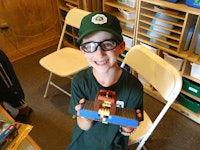
Homesickness & Staying in Touch
How Will I Stay in Touch With My Child?
You can email your child or send regular mail at any time; packages are not allowed. Phone calls with your child can be scheduled with our office at anytime.
News is posted through the summer and full time photographers capture the action day by day. Camp theatrical productions and sings are captured on video and shared with parents.
How Do You Handle Homesickness?
Camp is about growth. Almost every camper comes to a point when their thoughts turn back to people or things at home, and that’s normal. It generally happens when the fast-paced activities have stopped and the noise settles down — rest hour or later in the evening. Children grow and mature in big ways as they experience the natural process of acclimating to a new environment, learning to be at peace somewhere other than home.
Very few campers have any real difficulty adjusting to their camp home, but we train our counselors to keep an eye out, engage children who might need some extra encouragement, and to keep group leaders in the loop. Group leaders work in tandem with parents to lead children to a positive outcome!
What’s YOUR question?
Want to know more about the summer experience? If you have any concerns for your child’s well-being, let us know!
What’s the Next Step?
During the summer months when camp is in session, we recommend that you arrange for a private tour of our camp. If you cannot make the trip, or if camp is not in session, we recommend arranging an in-home visit with one of our directors.








